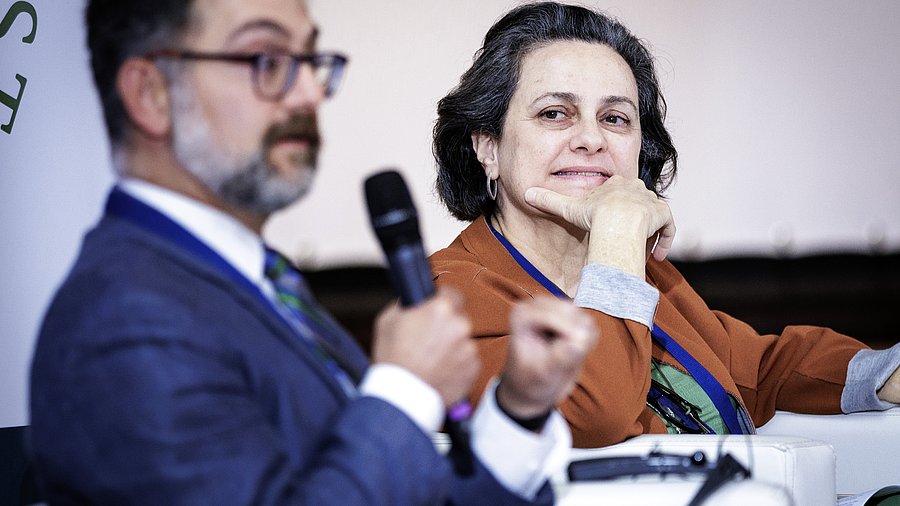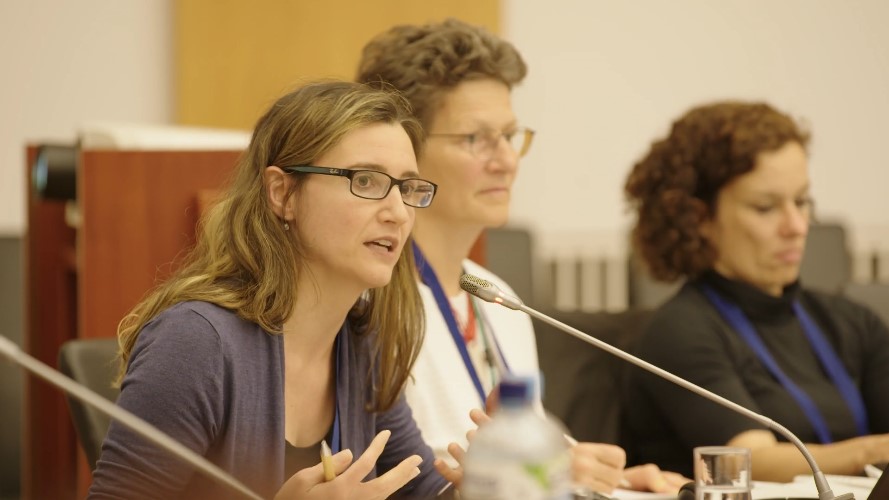
Hilal Elver, during the working group on the role of the World Food Committee (CFS) in reinforcing the right to adequate food at the Policies against Hunger XIV Conference, on 27/28 June 2023 in Berlin.
©BMEL Photothek
Achieving the right to food calls for an urgent and profound transformation within our food systems. The fundamental principle of ensuring regular, permanent and unrestricted access to adequate food should be considered a basic human right, as outlined in the Universal Declaration of Human Rights (UNGA, 1948). Yet, despite the widespread endorsement of this declaration by many governments worldwide, translating this into practical reality remains a daunting challenge.
The responsibilities of governments to take action towards ensuring food security and the right to food are essential obligations. The battle for the realization of this fundamental right has been included in the reform of the Committee on World Food Security (CFS), completed at the end of 2009, and since then keenly advocated by the HLPE-FSN, whose various reports and expert members continue to support and raise awareness on this cause. In 2020, a new narrative for a food systems’ framework placed the right to food and human rights in a central position, as a guiding principle in food security and nutrition discussions, underscoring not only the interconnectedness of the right to food with other human rights but also its pivotal role in upholding human dignity (HLPE, 2020).
Moreover, the HLPE-FSN, in its most recent report “Reducing inequalities for food security and nutrition”, acknowledges once again the centrality of the right to food in achieving food security. It emphasizes that reaffirming this right in all conflicts can help reduce disparities in food security and nutrition outcomes. Inequalities have been shown to create human rights violations and serve as barriers to the right to food. Criticisms have been raised against global trade policies, current financial systems and corporate concentration of power within the food system for exacerbating these inequalities, necessitating radical reform. One of its main policy recommendations for equity-sensitive policies is the leveraging of existing human rights instruments focused on the right to food and other interdependent rights to address inequalities through human rights and justice principles to fulfill the SDG2 and thus achieve the full realization of the right to food.
The 14th conference for Policies Against Hunger, which took place in Berlin on the 27 and 28 June 2023, was an opportunity to discuss how the transformation of our food systems can be guided by a human rights perspective. This event, organized by the German Federal Minister of Food and Agriculture and chaired by the CFS Chairperson, Ambassador Gabriel Ferrero de Loma-Osorio, facilitated important reflections on:
The German Federal Minister of Food and Agriculture Cem Özdemir opened the conference. During the event, under the topic “Human rights-based approaches to food systems transformation”, around 250 participants from 28 countries developed recommendations for food systems transformation from a human rights perspective.
The discussions at the conference brought forth several critical themes that highlighted the urgency of transforming food systems and the imperative of adopting human rights-based approaches. First and foremost, localizing our food systems and recognizing the prominent role of local governments is an important step toward building resilience. Investments in local value chains, for instance, could mitigate the impacts of global crises on food systems.
“This opportunity to share our visions and proposals among a diverse range of actors is crucial. I believe it is key for transformation,” mentioned Elisabetta Recine, President of the National Council for Food and Nutrition Security in Brazil and member of the HLPE-FSN Steering Committee, who actively participated in the event. “Addressing and acknowledging all forms of inequalities is imperative for progress”, Recine added.

During the conference, it was underscored that policies addressing gender equality, women’s empowerment, and the strengthening of small-scale producers’ agency are of utmost importance. Equally vital is the issue of access to local markets, which calls for an international focus on the impacts of the external and harmful subsidies that distort food systems for small-scale farmers. The concept of food sovereignty and the incorporation of indigenous knowledge into policy development have gained significant traction. Additionally, more effective and inclusive collaboration and partnerships, particularly with marginalized populations, are needed to rectify power imbalances. Restructuring these power dynamics could empower the most affected groups, thus acknowledging them at the center of the food system transformation dialogue and respecting their rights.

Danielle Resnick, David M. Rubenstein Fellow – Global Economy and Development, Brookings Institution and Non-Resident Fellow, International Food Policy Research Institute (IFPRI) and member of the new HLPE-FSN drafting team on the upcoming report on urban and peri-urban food systems, also took part in the discussion about how to improve governance to transform our food systems. A key takeaway message from that discussion was the need to build enabling environments for citizens to realize the right to food, which requires transparency on public spending, enhanced right-to-information laws, and accountability mechanisms to track both public and corporate activities in the food system.
Furthermore, Hilal Elver, member of the HLPE-FSN Steering Committee and previous UN Rapporteur on the Right to Food, who co-chaired with the South African Ambassador Nosipho Nausca-Jean Jezile the working group about “The role of CFS in advancing the right to adequate food”, emphasized the potential of the CFS in playing a central role in the fight to achieve the right to food.
“Utilizing human rights mechanisms and legislation is a key driver of positive changes in our food systems”, Elver asserted. For this purpose, advocating, promoting and raising awareness about CFS policy products related to the right to food can serve as a way forward to realizing this right and help to reduce hunger and malnutrition that rise steeply everywhere among marginalized people.
“Food is a fundamental human right, it should not be a privilege”, Elver affirmed. In this context, there is a pressing need for legal empowerment to bring transparency, and accountability mechanisms for both public and private sectors. “There is a shocking failure in addressing criminal acts of deliberate starvation and other severe violations of the ‘Right to Food’”, concluded the HLPE_FSN expert, explaining how governments must take the lead in working with all players to develop effective mechanisms to participate in decision-making processes to develop and implement human rights-based policies for FSN Building on existing frameworks and policies that respect, protect and fulfill the right to food is an effective pathway and rebalancing of power among various players and ensuring accountability are key to food systems transformation, which goes hand-in-hand in achieving the right to food.
This conference reminded participants that achieving the right to food is not only a moral imperative, but a legal obligation It is a cause that requires concerted efforts, radical transformation and unwavering commitment from governments, international organizations and individuals. One step towards human rights is one step towards a more just and equitable world.
In the pictures: (1) Elisabetta Recine and Michael Fakhri, UN Rapporteur on the right to adequate food at the conference. (2) Danielle Resnick, chairing the working group on "Better governance to transform our food systems". Images' copyright: BMEL Photothek.
References
HLPE. 2020. Food security and nutrition: building a global narrative towards 2030. A report by the High Level Panel of Experts on Food Security and Nutrition of the Committee on World Food Security, Rome.
HLPE. 2023. Reducing inequalities for food security and nutrition. Rome, CFS HLPE-FSN.
German Federal Ministry of Food and Agriculture (BMEL). 2023. Conference Policies against Hunger, Human rights-based approaches to food system transformation. Conference report. Berlin. (also available at https://www.policies-against-hunger.de/fileadmin/SITE_MASTER/content/Dokumente/2023/Results/Report_of_the_results_Policies_against_hunger_conference_2023.pdf)
United Nations General Assembly (UNGA). 1948. Universal Declaration of Human Rights. Resolution adopted by the General Assembly on 10 December 1948, General Assembly resolution 217 A. Paris. (also available at https://www.un.org/en/universaldeclaration-human-rights/).
Human Rights Council. 2020. Critical perspective on food systems, food crises and the future of the right to food - report of the Special Rapporteur on the right to food. Report presented on 21 January 2020 to the Human Rights Council, 43rd session. (https://www.ohchr.org/en/documents/thematic-reports/ahrc4344-critical-perspective-food-systems-food-crises-and-future-right)